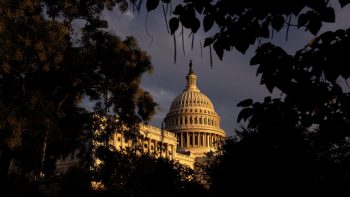Congress, Bush draw fiscal battle lines
TEXT OF STORY
KAI RYSSDAL: The talk in Washington today was about spending of a different sort. Last night, the House overturned the president’s veto of a big water bill — $23 billion for flood control and environmental restoration projects around the country.
The Senate’s set to do the same thing this afternoon, which will make this bill the first veto override Mr. Bush has had to deal with. Right about here we’re obliged to point to the calendar again and note that we’ve got 364 days until the presidential election.
As our Washington bureau chief John Dimsdale reports, the stage is now set for a political fight over fiscal responsibility.
John Dimsdale: Congress hasn’t delivered any of a dozen budget bills to the White House a month into the fiscal year. And the President is threatening to veto just about every one.
Thomas Mann: It’s to assert an image of fiscal conservatism.
Thomas Mann at the Brookings Institution says spending growth during the president’s first six years in office means now he’s a born-again fiscal conservative.
Mann: This is a symbolic fight for the most part, in which the president, supported by just enough House Republicans, has decided to pick a fight to kind of rouse the conservative base.
Democrats say their bills support much-needed health, education, security and veterans programs. Maya McGuiness with the Committee for a Responsible Federal Budget says the finer points of the arguments are lost on the public.
Maya McGuiness: Most voters, they just know that the White House keeps talking about those big-spending Democrats. That’s the picture the Republicans are trying to paint.
But Norman Ornstein at the American Enterprise Institute says today’s veto override shows certain programs have bipartisan support and some Republicans think the White House veto strategy might cost them.
Norm Ornstein: Once you’ve had one overridden, it makes it easier for people to do it another time. And it undercuts your argument that this is all about excessive spending when a very, very substantial number of your own Republicans defects. So it’s significant.
Congress is likely to reset the deadline for final spending bills from mid-November to mid-December. In Washington, I’m John Dimsdale for Marketplace.
There’s a lot happening in the world. Through it all, Marketplace is here for you.
You rely on Marketplace to break down the world’s events and tell you how it affects you in a fact-based, approachable way. We rely on your financial support to keep making that possible.
Your donation today powers the independent journalism that you rely on. For just $5/month, you can help sustain Marketplace so we can keep reporting on the things that matter to you.


















